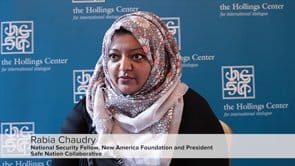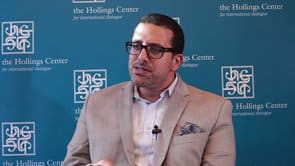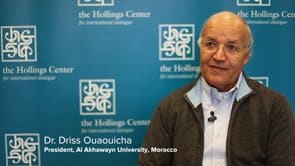Browse Topics
Categories
Format
Multimedia
Speakers Series

Video: Workshop on Emergency Preparedness and Disaster Response for Iraqi Cultural Heritage Experts
On November 7-8, 2016, the Hollings Center sponsored a meeting for 40 Iraqi cultural heritage specialists at the Iraqi Institute for the Conservation of Antiquities and Heritage (IICAH) in Erbil, Iraq. The meeting, organized by IICAH Executive Director Brian Lione, resulted in conversations on what the specific needs of Iraqi cultural heritage specialists are in […]

Mai E’leimat on Grassroots Efforts for Counter-Radicalization
Mai E’leimat, Director of Research and Fundraising for Al Hayat Center for Civil Society Development, discusses the techniques used by her organization to promote counter-radicalization and offers advice for other organizations looking to accomplish similar goals. She also specifically discusses programs aimed at women.

Rahma Dualeh on Violent Extremism in East Africa
Rahma Dualeh, the Director of Frontline Consult: African Solutions for African Challenges, discusses the international community’s response to extremist violence in East Africa. Specifically, she explains how violent extremism in East Africa differs from that of the Middle East, and offers suggestions for how the international community can tailor its response and resources to these […]

Lia van Broekhoven on a Human Security Approach to CVE
Lia van Broekhoven, Executive Director of the Human Security Collective, addresses the question: “What is the human security approach to countering and preventing violent extremism?” She also discusses the potential roadblocks to using a human security framework to addressing violent extremism.

Rabia Chaudry on American Muslim Identity
Rabia Chaudry, National Security Fellow at the New America Foundation and President of Safe Nation Collaborative, discusses changes to American Muslim identity following 9/11. She discusses how the rapid need for American Muslims to answer for broad aspects of Islam created the “professional Muslim” and offers ideas for how Muslims in American can reclaim personal […]

Ahmed Younis on Reform Among American Muslims
Ahmed Younis, Adjunct Assistant Professor at Chapman University and International Ambassador for Global Ethics and Social Justice for the Paulo Freire Democratic Project, explains his view of the need for reform among Muslim Americans. Specifically, he discusses the need for increased religious literacy to create a modern, just Muslim identity amongst youth and the concept […]

Key Strategies in Countering Extremism: Experiences from the MENA Region and Pakistan
April 30, 2015 Kadir Has University Manal Omar, Acting Vice President of the United States Institute of Peace and Shafqat Mehmood, Co-founder and Chairman of Paiman Alumni Trust gave a talk at Kadir Has University entitled Key Strategies in Countering Extremism: Experiences from the MENA Region and Pakistan. The event was co-organized by the Hollings […]
A non-profit, non-governmental organization dedicated to fostering dialogue between the United States and countries with predominantly Muslim populations in the Middle East, North Africa, South Asia, Eurasia and Europe
Stay Informed
Subscribe to our mailing list to stay up to date on our latest information.


